Jharkhand TGT (JSSC) Mock Test - 1 - Jharkhand (JSSC) PRT/TGT MCQ
30 Questions MCQ Test - Jharkhand TGT (JSSC) Mock Test - 1
What is the sum of the squares of direction cosines of the line joining the points  and
and  ?
?
 and
and  ?
?| 1 Crore+ students have signed up on EduRev. Have you? Download the App |
What is the image of the point (1, -2, 3) in the plane?
If  lies in first quadrant, then the value of
lies in first quadrant, then the value of  is:
is:
 at the points
at the points  are parallel to
are parallel toIf  and
and  are in
are in  , then the straight line
, then the straight line  will always pass through a fixed point. The fixed point is:
will always pass through a fixed point. The fixed point is:
Cut-off Region of a Junction Field Effect Transistor is also known as:
Which of the following part of the Carnot engine is a heat reservoir at lower temperature ?
Study the given ray diagrams and select the correct statement from the following.

The surface of a spherical shell is uniformly charged. Then what is the electric field inside the spherical shell?
The rate of heat transfer in a conducting rod will increase by-
A transistor can be made to operate as a switch by operating it in which of the following regions?
Which among the following statements are true with respect to semiconductor breakdown?
If the current in the wire is doubled then the heat produce will become:
Modern non-stick cookware and the flat end of an electric iron has a coating of a polymer. Identify the name of the polymer.
 and vapour density of its chloride is
and vapour density of its chloride is  . The atomic mass of metal is:
. The atomic mass of metal is:Which of the following ore is concentrated using group 1 cyanide salt?
Which of the following fibres is used for making parachutes?
 is
is  . How much sucrose is to be added to
. How much sucrose is to be added to  of water such that it boils at
of water such that it boils at  Molal elevation constant for water is
Molal elevation constant for water is  .
.When a primary amine reacts with chloroform in alcoholic KOH. the product is:
Consider the elements Mg, Al, S, P and Si, the correct increasing order of their first ionization enthalpy is:
The bond length between hybridized carbon atom and other carbon atom is minimum in:
The first order rate constant for the decomposition of ethyl iodide by the reaction

at  is
is  . Its energy of activation is
. Its energy of activation is  . Calculate the rate constant of the reaction at
. Calculate the rate constant of the reaction at  .
.
If equal volumes of  and
and  solutions are used to oxidise
solutions are used to oxidise  in acidic medium, then
in acidic medium, then  will be oxidised by:
will be oxidised by:
The electrode potential of M / M of 3d-series elements shows positive value of:
Which of the following compounds will be suitable for Kjeldahl's method for nitrogen estimation?


 be two point which joins the line.
be two point which joins the line.
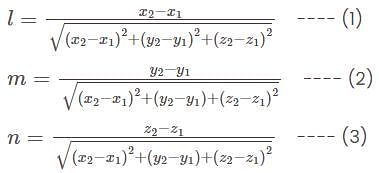


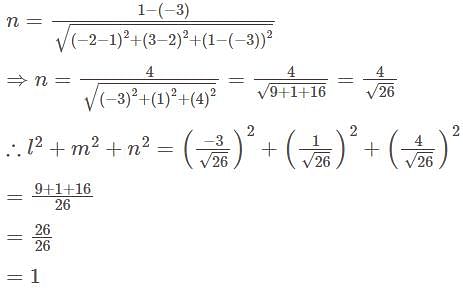
 then:
then:


 and
and 
 is:
is:


 and
and 

 then
then 



 Let
Let 


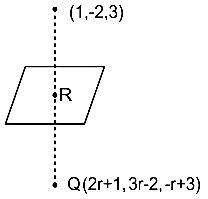

 - 2,
- 2,  + 3)
+ 3) - 2) - (
- 2) - ( + 3) = 7
+ 3) = 7 -6 +
-6 +  - 3 = 7
- 3 = 7

















 ,
,





 The required value is
The required value is  .
.


 Slope
Slope 


 Tangent at this points will be parallel to
Tangent at this points will be parallel to 
 are in
are in  .
.
 (i)
(i) (ii)
(ii)
 lies on the line.
lies on the line.





 for
for 
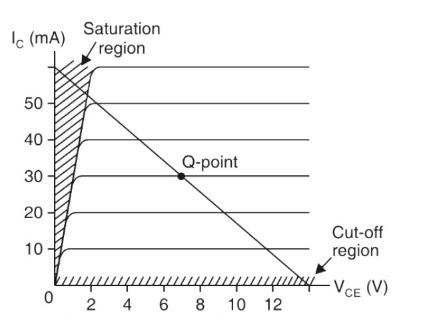
 and
and 
 ,
, ....(1)
....(1)

 .....(2)
.....(2)


 Molecular weight of metal chloride.
Molecular weight of metal chloride.


 equivalent weight
equivalent weight  valency
valency










 (approximately)
(approximately) of sucrose is to be added.
of sucrose is to be added.
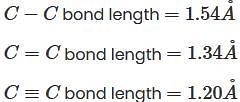


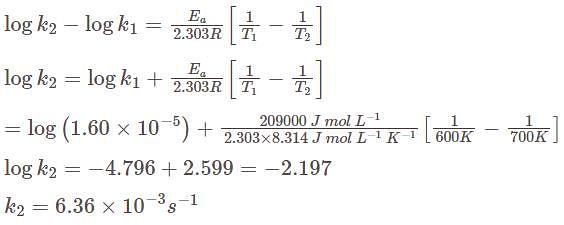
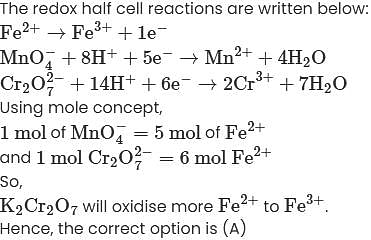
 of 3d-series elements. The rest of the metals are good oxidizing agents with
of 3d-series elements. The rest of the metals are good oxidizing agents with 
















